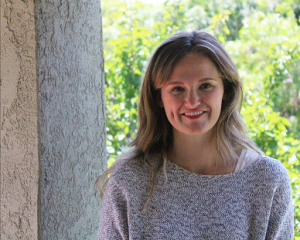Ahna Kruzic, Community Organizer, Activist, Researcher on Food Systems

Ahna Kruzic
Ahna Kruzic is a community organizer turned activist-researcher from rural southern Iowa. Ahna has worked as a researcher, community organizer, coalition-builder, and more. As Director of Publications and Communications at Food First, otherwise known as the Institute for Food and Development Policy, Ahna coordinates, contributes to, and publishes communications, analyses, and research-for-action which seeks to dismantle exploitative racism, capitalism, and oppression in the food and agriculture system.
What is the educational and career path that led to your current career?
I’m from rural Iowa – I grew up in a community deeply impacted by industrial agriculture and food production. As agriculture increasingly industrialized in the 1990s, I saw people lose their farms to consolidation; many of these farms had been in families for generations. Bigger farms, also struggling, bought smaller farms out in an effort to stay in business. Meanwhile, those farmers who were able to stay in business had to continue getting bigger to stay afloat and survive on ever-slimming profit margins, characterized by low grain prices and high land and input prices. Inputs such as synthetic fertilizers, pesticides, and herbicides keep large farms labor-efficient, cutting costs for farmers – thus, Iowa’s waters are teeming with nitrates and other toxins. Over 750 of our waterways are impaired – meaning the water is not suitable for either recreation, drinking, or supporting aquatic life.
I have a Bachelors degree in sociology and gender studies and a Masters degree in sustainable agriculture and sociology. I have worked in education, community organizing, coalition-building, and research. However, the path that led me to where I am today is simply my experience of home. I’m fighting for a future where my friends can farm, my neighbors can drink their water, and future generations have the right to live, work, play, and feed themselves at home, wherever that may be.
What environmental issues are of most concern to you?
All environmental concerns are connected. We exist in a social and economic system that operates by exploiting people and the planet in the name of profit. However, this exploitation is not experienced equally. Women (and in particular, women of Color), communities of Color, and rural communities are disproportionately impacted by environmental injustices. Most concerning is not a particular environmental issue, but rather, that many in the mainstream environmental movement are not supporting and following the leadership of the communities most impacted by environmental injustice. These communities have been fighting environmental injustice for decades – and in some cases, centuries. Environmentalism for these folks is not just an interest or a passion, but survival – and the mainstream environmental movement has so much to learn from them. Their solutions are right in front of us, we just have to follow and support their leadership for a transformed, environmentally just future.
What do you think are some challenges and opportunities facing women in the environmental movement today?
There are many challenges facing all women in the environmental movement today. However, I am a white woman, and the challenges I experience are very different than those women of Color experience. We must acknowledge this fact – and to fellow white women, we must learn to support our colleagues of Color in addressing their challenges.
With that said, it has been my personal experience that some in our movements would like to believe that sexism does not exist in environmentalist spaces – that because we are working in a progressive space, that must mean we all also act in solidarity with women all of the time. However, the experiences I have had and the experiences of other colleagues who do not identify as men tell me that this is not the case. Sexism is alive and well in our environmentalist spaces, and our colleagues and movements suffer because of it. For example, I have worked in spaces where good ideas from women are credited to men, men appropriate the ideas of women, women are sexually harassed, men speak over women, women are asked to do administrative tasks outside their job descriptions when men are equally qualified to do so, and more. We have the opportunity to support each other in acknowledging that sexism exists in movement spaces – and we must do so for a stronger movement that better reflects the diversity of those impacted by environmental injustice.
